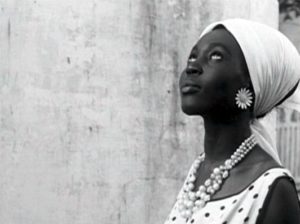 Ousmane Sembéne’s 1966 film, about a young Senegalese woman feeling lost when she is taken to France as the servant of a wealthy family, is widely considered the first major film from sub-Saharan Africa.
Ousmane Sembéne’s 1966 film, about a young Senegalese woman feeling lost when she is taken to France as the servant of a wealthy family, is widely considered the first major film from sub-Saharan Africa.
Ousmane Sembéne was a very important figure in the history of film. Born in Senegal, he attained prominence as a novelist in his 20s and 30s, but when he realized that his readership was almost exclusively French, or from the very small and elite class of educated Africans, he decided to try his hand at filmmaking, an art form that was popular and accessible to the working poor of his country. After making three groundbreaking short films, in 1966, he wrote and directed a full-length feature called Black Girl. It is widely considered the first major film from sub-Saharan Africa.
Diouiana, a young woman living in Dakar, sits with other jobless women on a street corner hoping that the employers who drive by will give her work of some kind. In a stroke of luck, she is hired by a French woman, the wife of a minor official, to watch her children. The work is pleasant, and she is finally making a little money to help her parents and siblings. When the French couple offers to take her with them to the south of France for a period of time, she eagerly accepts, thinking that this will be an opportunity to escape the dull environment of the former colonial outpost of Dakar while broadening her horizons, and to make and save money for the future. But her situation in France is not what she expects. The couple now expects her to be a maid rather than just a babysitter; she is allowed almost no time for herself or to leave the house; and instead of being surrounded by family and friends, she is essentially alone—her white employers and their friends treating her with contempt, or at best acting as if she’s not even there.
For the lead role of Diouiana, Sembéne chose an unknown, a seamstress named Mbissine Therese Diop. Diop has a striking presence. Her performance beautifully conveys Diouiana’s comfort and ease in Senegal, and her concentrated inwardness and isolation in France. The director had to work under the constraint of a shoestring budget. He had to use black & white instead of the more expensive color, but I think the stark look of the picture actually helps it. He had to get the right shots quickly, not having the leisure of many takes. And direct sound for the dialogue was impossible because Sembéne had no sound-sync equipment. He used overdubbing, and a different actress’s voice for Diop, recorded in Paris.
Despite these handicaps, the film powerfully conveys the alienation of this black girl losing her freedom and identity in a foreign place. The story is simple, and easy to understand, yet the director uses a variety of subtle techniques to evoke political and cultural themes. Colonialism and its devastating after effects informs all the relationships in the film. An African mask that Diouiana presents as a gift to her employers becomes a symbolic presence, a shadow of the ancestral world within the modern setting. Sembéne uses montage combining realism with experimental editing effects, and we hear the main character’s inner monologue as emotional counterpoint to her bewildering experiences in France, such as a guest kissing her without permission because, as he says, he’d never kissed a “Negress” before. The indignities get worse, yet all the while Sembéne is not without understanding of the white characters—they are only foolish people playing unconscious roles.
I had seen other good films by Sembéne over the years, but I kept looking for this one, and I finally got to see it last February when The Loft had a special screening of a restored print. Now Criterion has released it on DVD and Blu-ray. Black Girl is a haunting poem of loneliness, and a landmark of African cinema.






